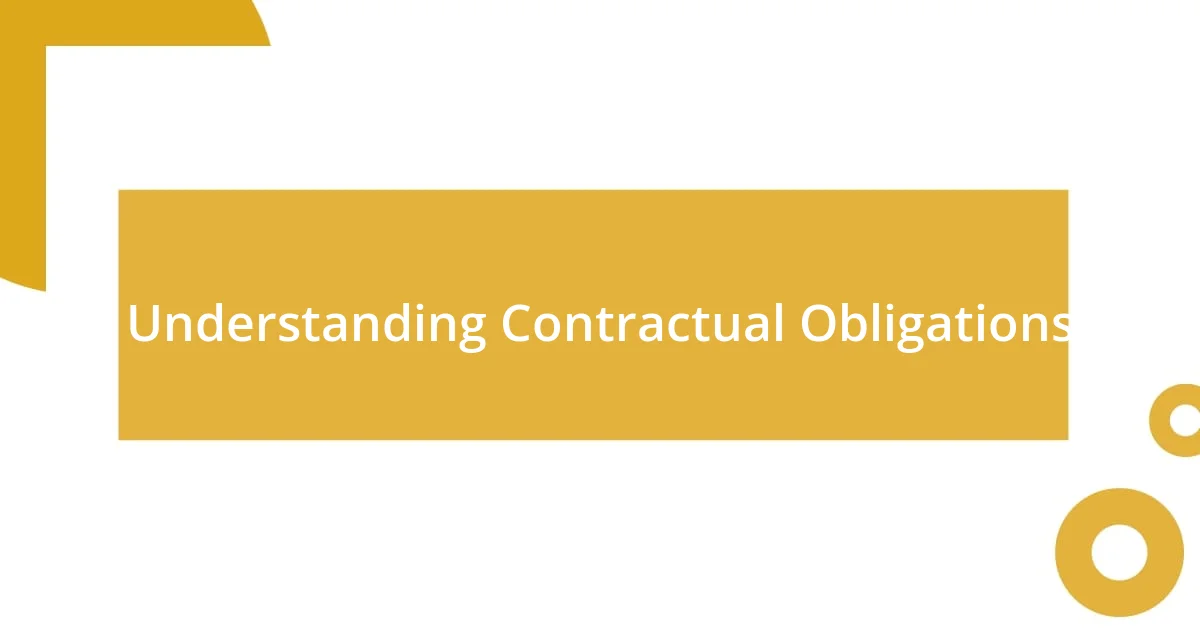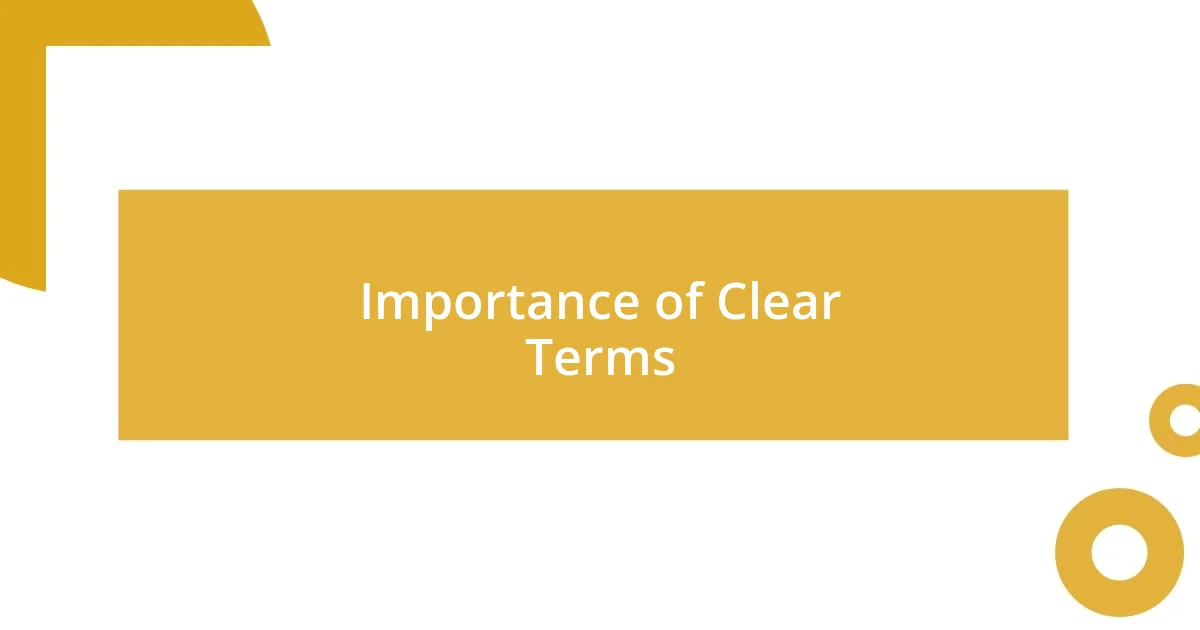Key takeaways:
- Understanding contractual obligations is essential, as they represent commitments that can significantly impact relationships, highlighting the importance of clarity in terms to prevent misunderstandings.
- Common types of contractual obligations include performance, confidentiality, and indemnification, each requiring accountability and trust among parties involved.
- Breaching a contract can lead to serious financial and emotional consequences, emphasizing the need for effective compliance strategies like regular reviews and open communication during negotiations.

Understanding Contractual Obligations
Understanding contractual obligations can seem daunting at first, but I believe that breaking it down into simpler elements makes it more approachable. Essentially, when we enter into a contract, we are committing to fulfill specific responsibilities that can significantly impact our relationships, whether personal or professional. For instance, I once had a friend who signed a lease agreement without fully reading the terms. That experience taught us both the importance of understanding what we were agreeing to. Have you ever found yourself in a situation where you overlooked a detail in a contract?
Another fascinating aspect of contractual obligations is their binding nature. Once you agree to the terms, it’s not just a handshake; it’s a promise on paper. I remember negotiating a service contract once, where every clause felt negotiable, yet I learned that each obligation, no matter how small, holds weight in the eyes of the law. It made me wonder, how often do we casually overlook the impact of our agreements?
Additionally, the emotional weight of these obligations cannot be understated. They represent trust, reliability, and sometimes, vulnerability. I once worked with a client who struggled to uphold their end of a contract due to unforeseen circumstances. This taught me how these obligations can affect not only our decisions but also our integrity. It prompts the question: are we prepared to navigate the consequences when life throws us a curveball?

Importance of Clear Terms
When it comes to contracts, clarity in the terms is crucial. I recall a time when I entered a business partnership and assumed we were on the same page about revenue sharing. It turns out that my partner had a different interpretation, leading to confusion and tension. This experience reinforced my belief that clear terms prevent misunderstandings and protect all parties involved.
Here are some key reasons why having well-defined terms is essential:
- Reduces Ambiguity: Everyone knows exactly what is expected, minimizing the risk of miscommunication.
- Facilitates Compliance: Clear terms make it easier for all parties to fulfill their obligations without second-guessing.
- Eases Dispute Resolution: If conflicts arise, unambiguous terms provide a straightforward reference to resolve issues.
- Builds Trust: Transparently outlining responsibilities reinforces a sense of reliability among all parties.
I’ve found that when terms are crystal clear, it builds a solid foundation for collaboration. In a freelance project once, I detailed every aspect of delivery and payment. This simplicity helped maintain a smooth working relationship and ensured that both sides felt valued and respected. It’s a lesson I carry with me: precise language fosters partnerships that last.

Common Types of Contractual Obligations
Common Types of Contractual Obligations can vary greatly, yet they generally fall into a few key categories. I often find myself thinking about the legal obligations that arise from an agreement, such as performing a service or paying for goods. For instance, when I signed a contract to renovate my home, I had the contractor’s obligation to deliver the project on time and within agreed specifications. Understanding these performance obligations helps establish accountability and sets expectations clearly.
Another common type of contractual obligation is the obligation to maintain confidentiality. This has been a cornerstone of my professional life, especially when I was involved in negotiations for a startup. I remember signing a Non-Disclosure Agreement (NDA) that ensured that sensitive information wouldn’t be shared. This kind of obligation builds trust and reinforces the idea that parties are committed to protecting each other’s interests.
Additionally, there’s a fascinating nuance to obligations related to indemnification. This concept, while a bit technical, simply means that one party agrees to compensate another for certain damages or losses. I recall a situation in which I agreed to indemnify a partner for any legal issues arising from a joint venture. Although it seemed like just another clause at first, the weight of that obligation underscored the importance of accountability in both our successes and setbacks. It made me ponder: how prepared are we for the risks we take on for each other?
| Type of Obligation | Description |
|---|---|
| Performance Obligations | Responsibilities related to delivering services or products |
| Confidentiality Obligations | Commitments to protect sensitive information |
| Indemnification Obligations | Agreements to compensate for losses or damages |

Strategies for Effective Compliance
Compliance with contractual obligations doesn’t just happen; it requires a proactive approach. One strategy I’ve found incredibly effective is regularly reviewing contracts throughout their lifecycle. I recall an instance in a project where the renewal terms slipped my mind until it was almost too late. Having a scheduled review process would have prevented that scramble. Could a simple calendar reminder make all the difference? Absolutely!
Involving all parties from the outset can significantly enhance compliance. I learned this the hard way during a collaborative project where not everyone understood their roles. We faced delays because of misaligned expectations. Encouraging open dialogues and clarifying responsibilities upfront is essential. It promotes a sense of ownership and accountability. Have you ever noticed how teams function better when everyone feels involved? I certainly have!
Lastly, leveraging technology can streamline compliance management. I remember discovering a contract management software that allowed me to track deadlines and obligations effortlessly. It was a game-changer for my workload, reducing anxiety around missed commitments. Why struggle with spreadsheets when automation can simplify our lives? By embracing tech, we can ensure that compliance isn’t just a checkbox but an integrated part of our daily operations.

Consequences of Breaching Contracts
Breaching a contract can lead to some serious repercussions. I remember working on a freelance project where I missed a crucial deadline, which left the client feeling frustrated and me scrambling to fix the situation. Not only did this affect my reputation, but it also jeopardized future opportunities. Have you ever been in a similar position, where a small slip-up cost you more than you bargained for?
The most immediate consequence of breaching a contract is often financial. When I was involved in a partnership that fell apart due to unmet obligations, I discovered firsthand how termination clauses can come into play. The financially responsible party typically has the right to seek damages, which can be quite hefty. It made me realize how important it is to assess the potential financial fallout before entering a contract.
Beyond just finances, there’s an emotional aspect to consider. The stress and anxiety of potentially losing a valued relationship can weigh heavily on someone. I once had a client who decided to pursue legal action after a breach, and watching that friendship dissolve was heartbreaking. This situation taught me that trust is at the core of every contract, and when that trust is broken, the fallout can ripple through both personal and professional realms.

Tips for Negotiating Better Contracts
When negotiating better contracts, always start by understanding what you truly need. I recall a time when I focused solely on the specifics of a deal without considering my essential requirements. I ended up locked into terms that didn’t serve my interests. So, I learned it’s essential to outline your priorities first. What do you really want from this agreement?
Open communication is another crucial element during negotiations. In one instance, I was negotiating with a vendor who had a completely different perspective on project timelines. By simply asking questions and clarifying their understanding, we discovered a common ground that helped us avoid potential conflicts later. Have you ever found clarity just by asking the right questions? It’s amazing how a thoughtful dialogue can reshape the entire negotiation process.
Don’t hesitate to be flexible, but also be firm on non-negotiables. I remember being in a room full of executives when an important clause was brought to the table. While I was willing to adapt on some points, I stood my ground on others that were critical for my success. This balance between compromise and assertiveness is vital. How far are you willing to bend before it affects your bottom line?















